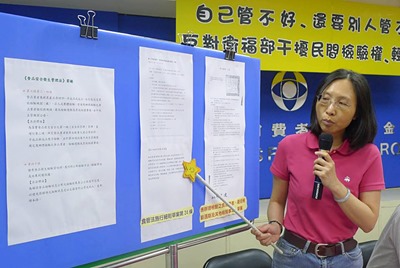The Ministry of Health and Fuzhou requires that the inspection units be announced, and the interference inspection approved by the Consumer Foundation.
Share + 1 Tweet Email
Last year's "Shang Zhou" and "Milk incident" used self-developed testing methods, which caused controversy from all walks of life. at the end of last month, the Ministry of Health and Welfare published the draft rules for the implementation of the Food Safety Law, requiring the private sector to release the test results. attach the test method, laboratory address, person in charge, etc., but the Consumer Foundation thinks that the correction is excessive, and the publishing unit will be responsible for the inspection, but it will require the publication of the inspection unit data, which may cause a chilling effect. "No laboratory dares to help with the inspection in the future."
Worried about the chilling effect, no laboratory dared to help test it.


Xie Tianren (first from right), honorary chairman of the Consumer Foundation, criticized the independent inspection of the relevant draft by the food industry published by the Food and Drug Administration.
In addition, Xie Tianren, honorary chairman of the Consumer Foundation, also criticized the draft independent inspection of the food industry announced by the Food and Drug Administration on the 28th of last month.
The draft stipulates that the aquatic food industry, meat processing food industry and dairy processed food industry with factory registration certificates must test for animal drug residues in their products; manufacturers and importers of all food additives, test the content of heavy metals in the finished products of the additives; and special nutrition food manufacturers who obtain inspection and registration permits to test the content of microorganisms and nutrients in the finished products.
The inspection frequency is at least once per quarter or batch, and the manufacturer must keep the inspection records until 6 months after the food expiration date.
Hsieh Tien-Jen says that the draft only looks at the category rather than the size of the industry. "is it appropriate to require small businesses who sell Plain Noodles to test it?" He lambasted that the new draft had no control over the big factories such as Unification, Yimei, Dingxin, and Taishan. In the plasticizer case, the big factory claimed compensation from the upstream manufacturers while saying that they were innocent victims, and the consumers were the unlucky ones. The FDA should take into account the characteristics of each category, judge the scale on the basis of the amount of capital, and identify the operators to be submitted for inspection.
Wu Xiwen, head of the Food Section of the Food and Drug Administration, said that the categories announced in the draft are of higher risk. For example, animal drugs and heavy metals all come from the source and will not disappear in the manufacturing process. Therefore, it is necessary to start with raw material management, and there is absolutely no unique large factory. And as long as there is a factory registration, it usually has a certain scale.
Wu Xiwen said that independent inspection is only one of the steps of the gatekeeper. Even if it is not in the announcement category, every operator must comply with the GHP good food standards to ensure the safety of raw materials. When plasticizer is used, the claim for compensation from the upstream is based on the contract between the two parties, but in the administrative penalty, the manufacturer cannot shirk the responsibility by "unknowingly". The operator can be fined 3 to 3 million if he violates the GHP.
Share + 1 Tweet Email
Related
- A course of planting techniques and methods on how to grow carrots
- How to plant the latest tulips?
- Is it better to pick tea in the morning or in the afternoon? When is the best time for tea to be picked? what is the third or fifth tea?
- Launch Yuanxiao Happy combination Haocha + Tea Yuan healthy Taste
- Penghu Tourism "Fireworks 20 Parade with You"
- 2022 West Lake Happiness holds "Digital Revitalization Voucher" and draws iphone13 and laptop.
- Banqiao Fuzhou social houses are designed to change start-up combined with police elimination to create a safe and livable environment
- The convenient measure of "mechanical weeding" in Xinbei has been abused and the Agriculture Bureau has imposed heavy penalties on the illegal land consolidation.
- Changgeng University Joins Hands with Four Memory Factories to Rescue Memory Talent Shortage
- The list of Taiwan's top 100 MVP managers is listed by the Director-General of the Farmers' Association of Sanxia District.



